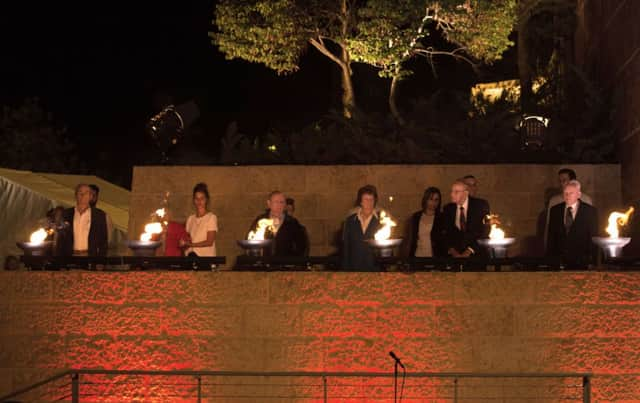Air raid sirens call Israel to Holocaust remembrance


For Israelis of all walks of life, the two-minute tribute offers time to remember and to focus on what that period represents to them. For Israel’s dwindling population of Holocaust survivors, however, the painful memories linger year-round.
Hundreds of thousands of survivors made their way to pre-state Israel after the war and helped build a country.
Advertisement
Hide AdAdvertisement
Hide AdWith fewer than 200,000 survivors remaining, Israel is still home to the largest such community in the world.
A group of survivors who endured the worst horrors of the Holocaust was asked to share their strongest singular memory. Without exception, each focused on those closest to them who did not survive.
Shmuel Bogler – a retired police officer from Hungary – never got to say goodbye to his family, taken from their home in Bodrogkeresztur and, like most of the Hungarian Jewish community, transported to Auschwitz in south-east Poland.
Of the family’s ten children, one had died young, three had fled before the war and three others were taken to work camps. Mr Bogler was left with his parents, one brother and one sister when they were crammed into a cattle car. After five suffocating days amid the stench of human excrement, they arrived exhausted at the death camp.
“The first thing they did was beat us and separate the women from the men. It happened so quickly, I couldn’t even part from my mother and sister,” the 84-year old said.
Next to go was his father, who was told to go left at the selection line of Nazi doctor Josef Mengele, who was known as the “Angel of Death” for deciding who would live and who would die.
“I remember him begging: ‘I am still young, I can run, I can work’. But it didn’t help and I couldn’t say farewell to him either,” Mr Bogler recalled.
At 14, he and his brother were left alone. They survived Auschwitz, where he remembers the screaming of Jewish inmates who were burned alive and the smell of their charred flesh.
Advertisement
Hide AdAdvertisement
Hide Ad“I don’t know if mother and father were among them. I have no evidence of how they died,” he said.
The brothers wandered together between work camps, where he remembers them being constantly hungry and infested with lice. Eventually they were liberated from the Buchenwald concentration camp in Weimar, Germany, and Mr Bogler later made his way to Israel, where he fought in its 1948 war of independence.
“I still have nightmares to this day,” he said. “Just two weeks ago I had a dream in which I was taken to a death camp.”
Although he is no longer an observant Jew, Mr Bogler said he still goes to synagogue to honour his father who was religious and whose beard and sidelocks were sheared by the Nazis in humiliating fashion.
“The hardest part is not having a Jewish grave for my parents in which to honour them,” he said.
Figures yesterday showed that violent attacks against Jews worldwide dropped in 2013, but anti-Semitism is becoming more widespread in Europe amid a rise of extremist parties.
Researchers at Tel Aviv University recorded 554 violent anti-Semitic acts in 2013, including attacks on people and vandalism against synagogues, cemeteries and other Jewish institutions.
The figures showed a 19 per cent drop compared to 2012, when a deadly shooting at a Jewish school in Toulouse, southern France, sparked copycat attacks.